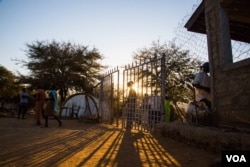The Sudanese people of the Nuba Mountains have faced years of war from the government of President Omar al-Bashir.
A few years ago, Russian-made Antonov warplanes bombed unarmed civilians, injuring and killing many. Most medical workers with international aid organizations left the dangerous area.
But one doctor stayed.
Dr. Tom Catena works at the Mother of Mercy hospital in Sudan’s South Kordofan state. There, he serves as the surgeon, pediatrician and as the obstetrician-gynecologist. Mother of Mercy is the only major hospital in the Nuba Mountain area.
Catena does everything he can to save those in the middle of conflict. Rebels of the Sudan People’s Liberation Movement-North are fighting the government forces of President Bashir. The rebel group once fought along with South Sudanese groups. South Sudan became an independent country in 2011, but remains stuck in conflict. South Kordofan shares a border with South Sudan.
Catena’s story is being told by Ken Carlson in the documentary film The Heart of Nuba. Carlson recently spoke with VOA’s South Sudan in Focus program. He talked about how he created the film.
“I found out that he was in great need in the Nuba Mountains five, six years ago, in need of aid. We raised ($102,000), put a truckload together of vaccines and supplies, and I realized it was a great story to tell,” Carlson said.
The film has been showing in the United States and other countries. Money from ticket sales goes to Mother of Mercy. So far, the movie showings have raised $500,000 for the hospital.
From engineering to humanitarian
Catena is from New York. He went to college at Brown University in Rhode Island, earning a degree in mechanical engineering in 1986.
He received offers of high-paying jobs, but he felt a different calling.
In the film, Catena talked about his decision to become a doctor. He said his brother did not understand it.
“I turn to my brother Felix and I’m like, ‘Felix, I should go to medical school.’ He’s like, ‘Tom, what are you talking about? You’re an engineer. What are you talking about?’ And I said, ‘No, I think I should do it.”
Catena first trained as a doctor in Kenya before going to South Kordofan state.
Carlson has known Catena for many years. He said he wanted to find out what made Catena so committed to people in the Nuba Mountains. So, he traveled to the area in 2014 and 2015 with his video camera.
The Heart of Nuba shows the difficulties of Catena’s work in the Nuba area.
Each morning, he wakes up early and goes to the small chapel to say prayers. After he drinks his tea, he goes to the hospital to start a long day. In one scene of the film, Catena treats a man who has just had his nose blown off by shrapnel.
Carlson said of Catena, “He’s furious! These families are being destroyed for no reason.”
The Heart of Nuba was recently shown at the National Cathedral in Washington, D.C. Many donors, activists and Sudanese people attended.
Nathaniel Nyoke was a displaced person, one of the so-called “lost boys” from South Sudan. He ran for five days to escape fighting in the city of Bor more than 20 years ago. He said one part of the film gave him chills. It was a scene in which young people were running from bombs. They sought shelter in a hole in the ground.
“Seeing the kids running from the Antonovs and then jumping in the hole to hide. That’s what I used to do,” Nyoke told VOA.
Nasima Catena is a Sudanese nurse. She and Catena are married. She described what it is like to be performing an operation while under attack.
She said, “No one comes out, but people always run to the foxhole with patients who are able to go, who are able to run.”
I’m Ashley Thompson. And I'm Mario Ritter.
Carol Van Dam Falk reported this story for VOA News. Mario Ritter adapted it for VOA Learning English. Ashley Thompson was the editor.
_____________________________________________________________
Words in This Story
surgeon –n. a doctor who performs operations involving cutting into people’s bodies in order to repair damage or remove damaged or diseased tissue
pediatrician –n. a doctor who treats babies and children
obstetrician-gynecologist –n. a doctor who treats women during pregnancy and a doctor who treats women’s reproductive system
chapel –n. a small church
shrapnel –n. small pieces of metal that scatter from an exploding bomb, shell or mine
chill --n. a sudden feeling of coldness or fear
foxhole –n. a hole dug by a soldier for protection from the enemy
We want to hear from you. Write to us in the Comments section, and visit our Facebook page.






